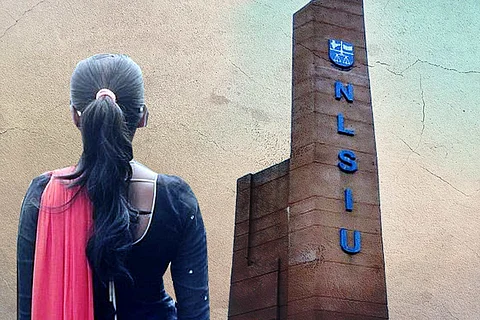

Over a year after journalist Priya Ramani won against MJ Akbar’s defamation claim for speaking up about the sexual harassment that she had experienced, a disciplinary committee constituted by the National Law School of India University, Bengaluru (NLSIU), punished two students – both women – for naming an alleged perpetrator of sexual harassment at the request of a survivor. They were held guilty of having committed “major misconduct” under its disciplinary rules, stripped of all positions of responsibility, and fined five thousand rupees each. Their offence was that they had, on behalf of and at the request of a survivor of sexual harassment, shared her experience, in her own words, with the college community, and named the alleged perpetrator while doing so. The two happened to be student facilitators appointed under the university’s code to combat sexual harassment.
NLSIU’s anti-sexual harassment mechanism existed long before the law required it. Its internal code was enacted in 2002, over a decade before the enactment of the Prevention of Sexual Harassment at the Workplace Act, 2013, and its implementation in institutions across India. A student-led effort in 2019 led to the code being amended to make the mechanism more accessible and equitable to survivors.
Under the code, it was the duty of the student facilitators to actively assist the survivor by exploring possible strategies and options available in resolving the situation. But when a formal complaint mechanism exists, why would someone want to call the perpetrator out instead?
There are dozens of reasons why a survivor would choose not to opt for formal redressal. These choices are often informed by the very real societal bias against survivors and women. Many do not receive support from their families if they choose to proceed with a formal complaint. Formal procedures are often daunting and intimidating to survivors regardless of how equitable they may seem on paper. Research even shows that the members of internal complaint committees can display the same biases as the respondent. Simply telling everyone the truth can be a way for survivors to reclaim their dignity and agency, especially when the alternative is repeating it to a committee of strangers, or professors, who will question every aspect of their experience.
Caste, gender identity, and sexuality all inform these decisions too. There are no provisions for caste-based or trans representation on, or sensitisation of, the internal complaints committee, despite university spaces historically being exclusionary of these groups. Homophobic bias is no secret either. Irrespective of all of this, it is solely the survivor’s choice whether or not to proceed with a formal complaint, and that choice cannot be held against her.
Following a letter sent by nearly 200 alumni condemning the university’s action, NLSIU issued a statement to the media, revealing that the disciplinary committee had reached its finding in accordance with the university’s principles of conduct. It stated that the students had caused “serious physical or emotional harm” to the alleged perpetrator (seemingly, by publicly naming him on behalf of the survivor) and breached the university’s information technology policies by violating the right to privacy of the alleged perpetrator, disclosing sensitive personal information, causing harassment, and sending an “unauthorised” email.
The right to privacy of every citizen is a fundamental but limited right. Every adjudicatory action requires the application of mind to balance conflicting values – here, the disciplinary committee of NLSIU simply had to balance the alleged perpetrator’s right to privacy and right against reputational harm, with the survivor’s right to live as a dignified and equal individual, free from sexual assault, and her freedom of speech with regard to her own experiences. The Supreme Court in its right to privacy judgment has even clarified that an individual’s zone of privacy is limited only to reasonable expectations of privacy. How can one claim that their act of harassing another individual ought to remain private?
Sexual assault and sexual harassment must be understood as symptoms of gender-based discrimination rather than as isolated issues leading to the occurrence of individual offences. Complying with not only the letter but also the spirit of the Sexual Harassment of Women at Workplace (Prevention, Prohibition and Redressal) Act, 2013 is the bare minimum – it is also essential for a university to understand its duty to create an atmosphere and a community where each and every person feels safe and is safe, especially as students from varied cultural backgrounds convene on residential campuses and explore different aspects of themselves, their newfound freedom, and topics such as informed consent within and outside relationships.
To begin with, universities could conduct meaningful workshops on consent and sexual harassment, and support student efforts to do so. If there are concerns about the fairness of internal committees, universities must make every effort to alleviate them.
Universities everywhere must also recognise why survivors of sexual harassment choose to name their perpetrators, and this understanding must guide any institution’s response to incidents such as the one at NLSIU. Ultimately, we would do well to remember that not talking about sexual violence is not the same thing as the absence of sexual violence.
The students’ appeal is now pending before the executive council of the university, while MJ Akbar’s appeal awaits its hearing before the Delhi High Court. The patriarchy certainly did not disappear after #MeToo; misogynistic attitudes have not gone anywhere and neither has the stigma experienced by survivors of sexual violence – often scaring them away from speaking up. At the very least, universities must not punish those who do.
The authors are alumni of NLSIU, Bengaluru. Mukta is a lawyer working on issues of land, forest, and environmental governance. Spoorthi is a Bengaluru-based advocate. Ayushi is a PhD scholar and lecturer at the University of Oxford.
Views expressed are authors' own.